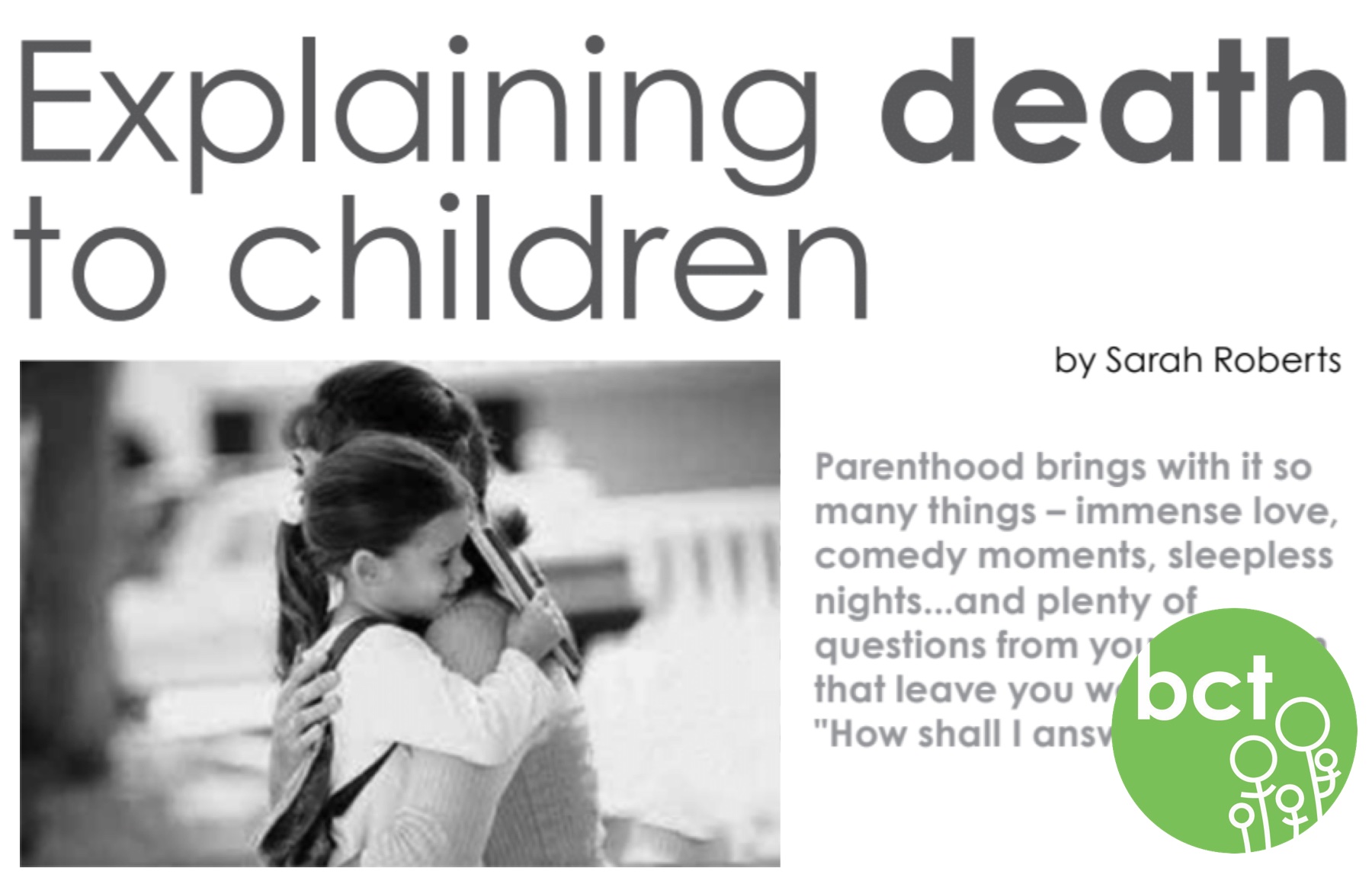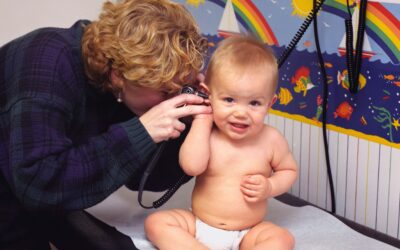Parenthood brings with it so many things – immense love, comedy moments, sleepless nights…and plenty of questions from your children that leave you wondering “How shall I answer that?”
At some point, one of the big issues every child grapples with is death, whether through direct experience when a family member or beloved pet dies, or just through a growing awareness as they get older. This gives rise to plenty of questions for parents to address. Sadly, my father died before our three children were born, and we’ve lost several relatives during the children’s short lives, leading to many questions from the children. I try to be open in discussing this with them and letting them see that sometimes I feel deeply sad about missing people I love who have died, but it can be hard to know if you’re taking the right line.
As another BCT member told me, “I had a tough time with my son when my mum died, as at aged nine he really couldn’t get a handle on it, and we spent a lot of time trying to explain it all. He even came with me to view my mum’s body, almost to reassure himself that it had actually happened. I worried whether this was the right thing to do, but for him, it was. Ditto with funerals, some children are kept away, others go – how do you know if they should be there or not?”
A further aspect of loss in expat life is that sometimes you and your child may not have seen the person who has died for some time, and may not be able to attend the funeral. The death is far away in an unseen place, so it can be even harder to accept that it is real.
With these thoughts in mind, I was interested to attend a recent discussion group led by Amy Goen at my children’s school to address how parents can talk about death with children.
Amy is from Texas and moved to Belgium in 2010 with her family when husband Kyle took over as pastor at Lifepoint, a new bilingual church in Brussels. Amy is also a teacher with direct experience of helping children come to terms with death.
The young head teacher of the school where Amy was working died unexpectedly, leaving staff dealing with their own sudden bereavement as well as helping the schoolchildren come to terms with his death. Following this event a teenage student at the school died from a flu infection. Bereavement counsellors were provided to train Amy and the staff team on how to help the school community deal with the deaths.
Below are Amy’s tips about preparing your children for the reality of death and how to deal with talking about it, combined with advice I’ve found from professional resources.
Approach the topic before it happens
Use events to teach the message that death is a part of life: wilting flowers, changing seasons and the death of a family pet demonstrate the cycle of life and death in nature, and introduce the idea that living beings die.
Be honest
Some adults try to protect children by not telling them what has happened, but the UK’s Royal College of Psychiatrists advises that it is best to let children know the truth at an early stage.
Use age appropriate language, but avoid euphemisms for death such as ‘went to sleep’, ‘gone on a journey’, ‘gone away’ or ‘lost’. These can be confusing for children and create misunderstandings and fears that they will die if they go to sleep/get lost etc.
Death, life and spirituality are abstract concepts and children’s ability to grasp the idea of death is determined by their age and development. Children under two have no concept of death. From two to five years old, children may see death as reversible, or something they have caused, and may make up fantasies to fill gaps in their knowledge. Up to about five or six children have a very literal view of the world, so it can be best to describe death in basic, concrete terms: ‘his body wasn’t working any more’. Between five and 11 years old children start to grasp the finality of death. An adolescent may understand that death is permanent but may experience denial, believing that it won’t happen.
Aim for simple honest explanations: “our bodies were not meant to last for ever”. This can give rise to trying to explain abstract concepts in terms a young child can understand, such as what is a soul, and where is it? English author C. S. Lewis answered, “You don’t have a soul. You are a Soul. You have a body.” Amy suggests looking for metaphors in nature that can help explain things we can’t see but feel, such as the wind.
How you explain spiritual matters will be influenced by your beliefs as parents. It’s a good idea to discuss between yourselves what you are going to say about your beliefs. If you have differing beliefs, Amy’s suggestion is to agree how you are going to explain this, before discussing it with the children.
It’s worth remembering that children are not always seeking a ‘deep’ response – when they ask where the person is now, they may just want to know that they are at the cemetery, not debate the afterlife.
Let them talk
Children need to know they can ask you anything, so let them talk about it as much as they want to. Sometimes it’s not clear what they mean. If you need to clarify what they are trying to articulate, it can help to ask ‘why do you ask me that?’ before attempting to answer.
Answer their questions simply – try not to overload them. There’s no need to cover everything in one sitting, and it’s okay to say you don’t know the answer.
Try to follow your child’s lead. For example, if they ask to see the body, or want to attend (or not attend) the funeral, agreeing with their wishes can help them to deal with the situation. Conversely, refusing to do something a child feels a need to do may lead to them storing up resentment and other emotions for the future.
Be prepared for repetition of questions, as children struggle to grasp what has happened. New questions about different aspects of death may surface as your children develop. Be patient. Grieving takes a long time, and may be stirred up by other big changes in life such as school or house moves.
Listen and observe your child
Give them opportunities to express their feelings, e.g. drawing pictures, playing with dolls, reading books, writing stories about or letters to the deceased relative. It can be helpful for children to write letters to a surviving relative about the person they’ve lost.
No one knows your child like you do, so listen and observe well and watch for regressive behaviour, anger or overly boisterous play, which may indicate that your child needs help processing his or her grief. Keep in mind also that regressing to younger behaviour can be a source of comfort at times of trauma and upset, so use your understanding of your child to judge whether this is something that will pass in time, or is more persistent. The Royal College of Psychiatrists’ link below includes a list of signs that professional help is needed, and there’s a useful table of stages of children’s grieving behaviour in the Marie Curie link (a UK cancer charity).
Let them see you grieve
Children take their cues from us and your tears let them know that grief is a natural part of life. Guidance from Marie Curie underlines this: ‘Remember that you cannot stop the pain of losing someone. It is right to be sad when someone dies and trying to protect children from unhappiness may make problems for them in later life…Don’t try to hide your pain. It is all right to cry in front of your child.’
It’s important to give yourself space for your own grieving. You need support as well. Don’t feel you have to carry everything on your own. Let people help you. If you can, organise some time away from the family and give yourself a break.
Cherish memories
Making photo albums, watching home videos and writing to or about loved ones can help children (and adults) process their grief while remembering the good times with that person. Children may find it hard to recall the person who has died, especially living overseas, and this can be very distressing. Photos or a memory box can be a comforting and positive way to help them remember.
Further resources
In Belgium, 24-hour support is available in English from the Community Help Service via its helpline. Call 02 648 40 14 or go to www.chsbelgium.org
There are also some excellent resources on the web as listed below:
www.childbereavement.org.uk
www.winstonswish.org.uk
www.mariecurie.org.uk/help/bereaved-family-friends/supporting-grieving-child
www.rcpsych.ac.uk/healthadvice/parentsandyouthinfo/parentscarers/deathinthefamily.aspx
By Sarah Roberts
This article was first published in the September 2012 edition of Small Talk magazine.






